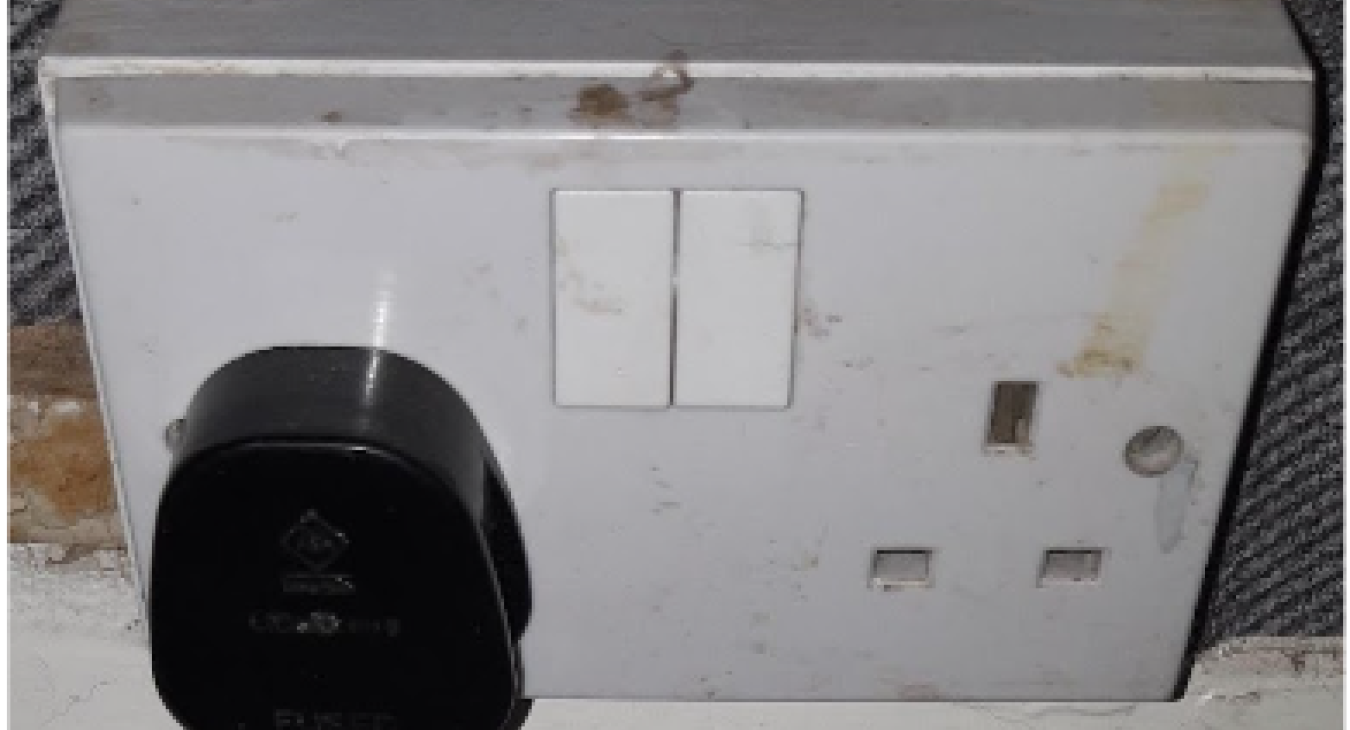Electrical Outlets Not Working Breaker Not Tripped
June 2024
If you have NO SOCKETS BUT NOTHING TRIPPED in 2024, there can be a number of causes for this. Read on for the most common reasons for single and multiple plug socket failure.
- Breaker in electrical panel or consumer unit gone bad
- Burnt out connections on the circuit
- Failed connections in the fuse box
- Power Cut Locally
- Cable severed somewhere on the electrical circuit
- Failed Single Outlet
- Low Voltage / Brownouts
1) Breaker In Electrical Panel or Consumer Unit Gone Bad
The electrical panel in your home is the brains and control centre of the electrical system. It is responsible for dividing up the mains incoming power into smaller circuits and delivering electricity around your home.
Each electrical circuit will have its own trip switch or fuse. These devices are designed to trip off or blow when there is an electrical problem but not all problems will make this happen.
If the breaker has gone bad then it may not trip but you may notice that you no longer have power to your plug sockets. Breakers have a limited life span and a failed breaker may not trip but simply failed internally. This can result in no further circuit breaker trips but simply a complete failure to operate any longer.
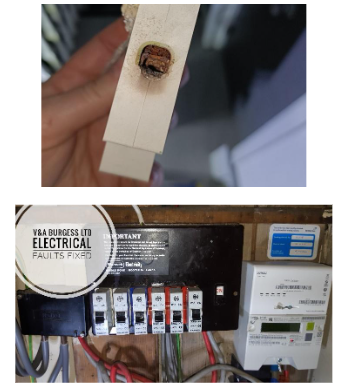
This old fuse box style electrical panel is now well out of date and the circuit breakers installed here are likely to be very old. Whilst age is not a guarantee of failure, there is a greater chance that old equipment will fail more frequently than newer equipment.
If your fuse box / consumer unit is now this old then it's time to have it replaced for newer equipment that offers better protection to the wiring and occupants of the property.
Back to top2) Burnt out Connections on the Circuit
When connections become loose, overloaded, or excessively warm they can burn out. The most common cause of failure is loose wiring. Each cable and electrical circuit has a safe operating current beyond which a circuit breaker should trip or fuse should blow. If this safe electrical current is exceeded then the connections and cables are likely to overheat and burn out.
A bad connection or faulty outlet can also cause connections to burn out on the circuit and this will result in the loss of power to the circuit. Electrical issues like this can be very dangerous and only a professional electrician should investigate the causes.
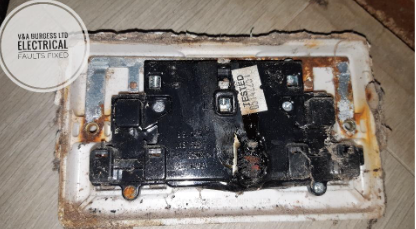
The photographs shows that a socket outlet has gone bad and the connections had burnt out at the back. This could have been a result of overloading on the circuit, a faulty plug socket or loose connections on the back of the socket.
Back to top3) Failed Connections in the Fuse Box
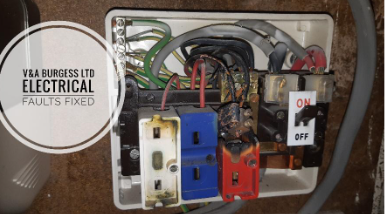
When connections fail inside the electrical panel, consumer unit or fuse box havoc can ensue. Loose connections in the breaker box can mean that power outlets around the property can fail. This type of electrical fault is very dangerous and the risk of electrical fires is very real.
We can see from the photograph that there had been a small electrical fire inside this old fuse box. The property needed rewiring and a new electrical panel had to be installed here. These old boxes have performed their useful service life these days and should be replaced.
An electrical outlet with loose wires will occasionally trip a newer circuit breaker or trip switch but not always. Where loose wires are within an old fuse box, nothing will generally trip and instead, overheating and melting will occur resulting in the need for expensive electrical repairs.
Back to top4) Power Cut Locally
One of the common causes for socket outlets failing is a localised power cut. You may not notice that your lights have gone off or you may not be using your lights at the time of the power cut.
When a power cut occurs or other mains voltage disturbance, nothing will generally trip in the electrical panel or consumer unit. If you suspect that you have a power cut then you should contact your local electricity network provider to see if there are any known issues with the power supply in your area.
Sometimes, other properties may not be affected by a localised power cut. Mains cables often run in two or three separate cables in the street and you may find that your neighbours are powered from a different cable. There may of course just be an issue with your cable from the street to your incoming mains supply equipment.
A certified electrician is the best person to call in this case. Electrical problems such as this can be found easily by an electrician with years of experience and the right test equipment. Your home’s electrical system is complicated, dangerous, and unpredictable at times so always consider using a professional to attend to your electrical needs.
Back to top5) Cable severed somewhere on the electrical circuit
If a cable has been severed somewhere on the electrical circuit it will not necessarily result in a tripped breaker or blown fuse. In these cases, it is likely that the power will suddenly stop working to the circuit and may even work intermittently.
If there is a short circuit this results in a large fault current that will blow a fuse or trip a breaker. If there is a ground fault then this may trip a GFCI outlet (Ground Fault Current Interrupter), RCD device or RCBO in the electrical panel or consumer unit.
If the cable is severed then there may not be anything that your panel can do. Very modern panels have protection against arcing which occurs when there is damage such as a severed cable or damage to electrical wiring.
A qualified electrician with the right knowledge and test equipment will be able to determine what has happened and the required repairs to put things right.
Back to top6) Failed Single Outlet
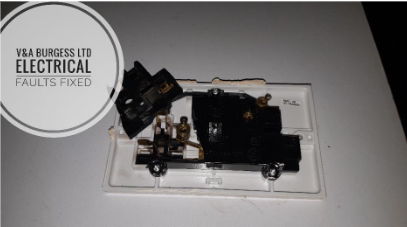
Where one single outlet fails then it is normally loose wiring at the rear of the outlet or a broken / faulty outlet. This outlet shown here failed because there was a great deal of damage at the back of the outlet.
When too much power is demanded from a single or double outlet then it can fail. Using a washer and dryer in the same outlet is likely to overload the outlet. Will not normally result in a tripped circuit breaker and will most certainly damage the outlet causing it to overheat and fail.
If a plug socket outlet is not working then please do not assume that it is a dead outlet. There could still be live wire connections in the rear of the terminals.
Fault finding is dangerous electrical work performed by the wrong person. To avoid the risk of electrical shock, it’s a good idea to get a licensed electrician to check a faulty wall socket as they will have the right equipment to ensure the outlet is dead and safe to work on.
It may just be that you need a new outlet and in which case, this is usually good news as its normally an easy fix and relatively inexpensive to have carried out.
Back to top7) Low Voltage / Brownouts
When the supply voltage drops low enough socket outlets can appear to stop working. This is because the operating voltage is too low to power equipment. Equipment has been designed to work on our supply voltages and within a small range of fluctuating voltage and when it receives less than its design parameters allow for it will cease to work.
Low voltage is often referred to as brown outs. Not a complete power outage but a period of low voltage that results in equipment failing to function correctly.
Likewise, a power surge is a period of overvoltage that is higher than intended and may result in equipment damage. You may notice that lights seem brighter for a brief period for example.
Back to top8) Summary
Whilst there are many causes for NO SOCKETS BUT NOTHING TRIPPED, its best to have the situation checked as soon as possible by electrical experts as any delay could result in damage to electrical appliances, the circuit breaker panel and an expensive electrical repair being necessary.
If you have outlet issues then the best option is to find a highly rated electrician with great Google reviews or other online reviews. A good electrician can find most electrical issues within a couple of hours and have things put right to ensure that your electric system is safe and operational.
Read more articles
- Log in to post comments

